Writing Dr. Who ~ A Talk led by Abi Falase
Abi Falase, writer and director, shared her journey from Bexley Grammar student to published author and playwright.
Abi Falase, writer and director, shared her journey from Bexley Grammar student to published author and playwright.
Winner of the Jack Petchey Speak Out Challenge, Regional Final.

On Monday, 3rd February, around 30 students attended Ms Stoddard’s True Crime Lecture.
The winners were:
1st - Divine: (M) Microaggressions. 2nd - Kartikeya: (R) Bravery and Determination. 3rd - Tadana: (L) Immigration.
On the 16th December, Bexley Grammar School were given the amazing opportunity to meet a real-life graphic novelist, Stephen Salah. He talked us through his most famous book, The Dark Lines of London. We were taught many new techniques and literary devices, such as putting in little extra details to add more flavour to the plot of our own stories.
We all came up with ideas for our own graphic novels. Evelyn in Year 8 won a free book for the most interesting idea. Thank you to Mrs Quinton for arranging this event. I can’t wait for another author to visit!
Kendra Kukunda, Year 8

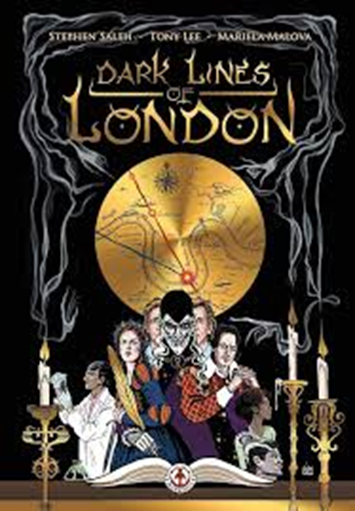
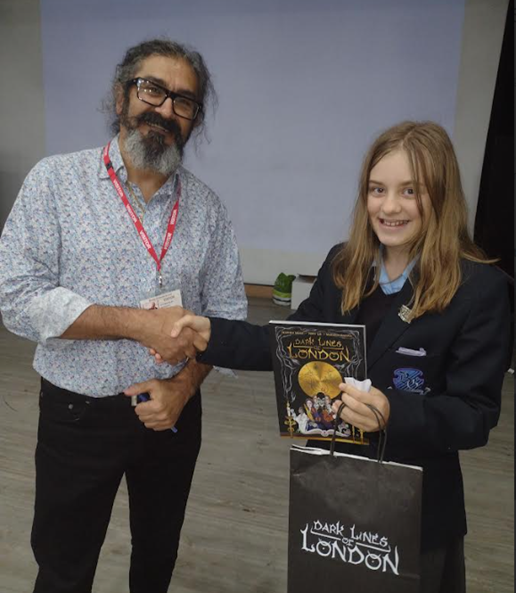
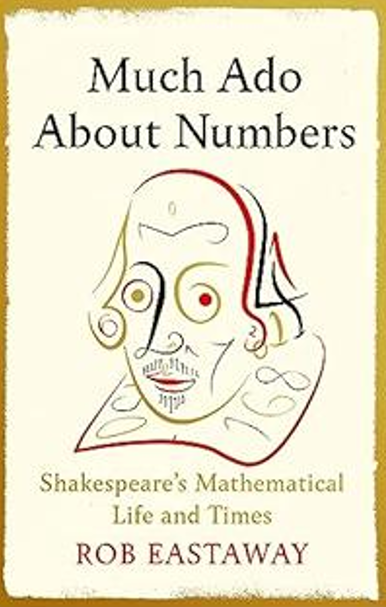 Walking into K10 - the theatre room also for assemblies - a slight sense of uncertainty hung over us. We were all wondering the same thing: what did our English teacher mean by: "Shakespeare and Numbers"? Most of us thought it was a bit odd, revisiting Shakespeare, a topic we had long since left behind in Year 8 Drama. After all, Shakespeare was a playwright and poet, not a figure you would associate with mathematics. But Rob Eastaway was about to change that perception.
Walking into K10 - the theatre room also for assemblies - a slight sense of uncertainty hung over us. We were all wondering the same thing: what did our English teacher mean by: "Shakespeare and Numbers"? Most of us thought it was a bit odd, revisiting Shakespeare, a topic we had long since left behind in Year 8 Drama. After all, Shakespeare was a playwright and poet, not a figure you would associate with mathematics. But Rob Eastaway was about to change that perception.
His presentation, spanning from Academic Monitoring to the end of Period 3, had to be captivating - and did not disappoint our expectations. He began, asking if we identified more as "Maths" or "Shakespeare" people, illustrating this with a Venn diagram on the board. Unsurprisingly, most of us leaned towards Maths, and few admitted to having any fondness for Shakespeare. Even fewer claimed to fall into both categories. Eastaway then boldly predicted that by the end of his talk, more of us would find ourselves in one, if not both, camps.
He explained that his grasp of mathematics would have been equivalent to what a modern Year 6 student learns, suggesting that we, as Year 8 students, were already more mathematically advanced than him. To illustrate this point, he showed how little maths was in his plays, hence the clever title of his book, Much Ado About Numbers.
 Eastaway had an impressive ability to hold our attention for a full hour and 15 minutes. Throughout the presentation, he gave us fascinating insights into how Shakespeare had learnt back then and how challenging even basic mathematical operations, like multiplication and division, were in his time. At one point, even inviting students to the front to demonstrate it.
Eastaway had an impressive ability to hold our attention for a full hour and 15 minutes. Throughout the presentation, he gave us fascinating insights into how Shakespeare had learnt back then and how challenging even basic mathematical operations, like multiplication and division, were in his time. At one point, even inviting students to the front to demonstrate it.
In between, he engaged us with quiz questions that explored how people approached problems back then. All in all, the assembly was not only informative but unexpectedly enjoyable and engaging.
Samuel Okedeyi and Avyan Poojari, Year 9
 For this year's annual World Book Day, the busiest day in the English Department’s calendar, we all went out with events and activities galore!
For this year's annual World Book Day, the busiest day in the English Department’s calendar, we all went out with events and activities galore!
As always, we had our most enthusiastic readers dress up as their favourite book characters. This event took place on Thursday 7th of March 2024 and provided a fantastic opportunity to celebrate the joy of reading.
Anh Nguyen & Leandra Fadiga, Year 12 English Prefects
Year 7 and 8 in some brilliant costumes and with some great book/prop combos! Our favourite costume was the Frog Prince (front row - you can’t miss him!)
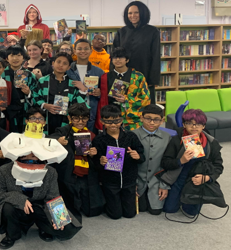
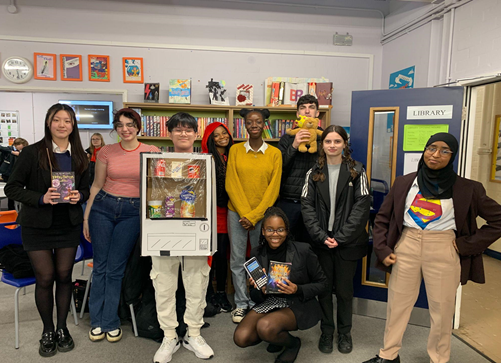
Year 12 English prefects and teachers join in on dressing up too!
Can you work out which character they are?
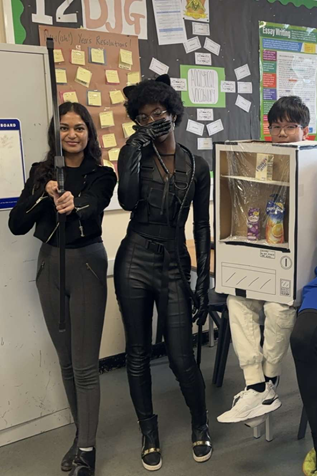
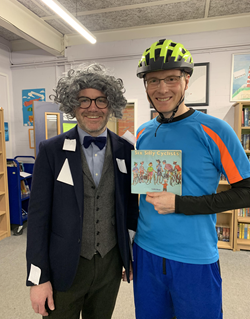
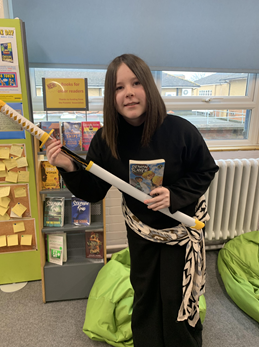
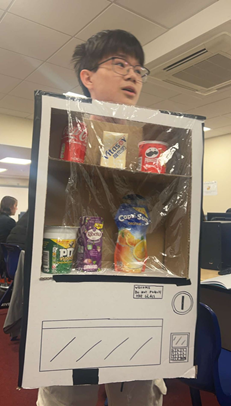

At BGS, World Book Day is a big deal, and we try to find extraordinary ways to celebrate it; and it usually involves a lot of healthy (yet fierce) competition. One such competition being… The Ultimate Reading Challenge. Students were asked to share a photo of themselves reading in a weird and wonderful location, and the winner was bestowed upon them a £10 book voucher!
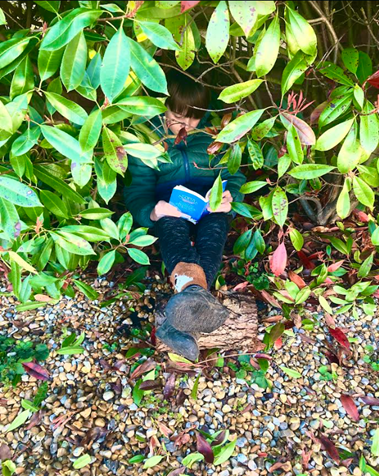
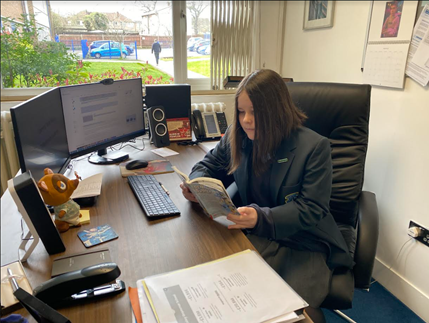
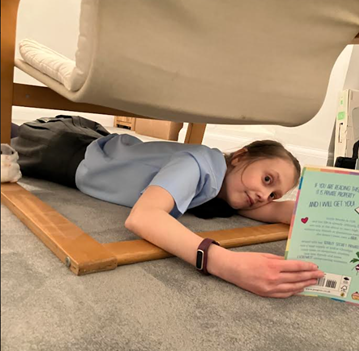
Another one of our many competitions, students were required to write a short story on a post-it note and give their entries to Mrs Carey (the school librarian). While this may have seemed like an impossible task for many, a lot of students came through and there were a lot of creative and fascinating entries. After a lot of consideration and thought by a panel of Year 12 English Prefects...
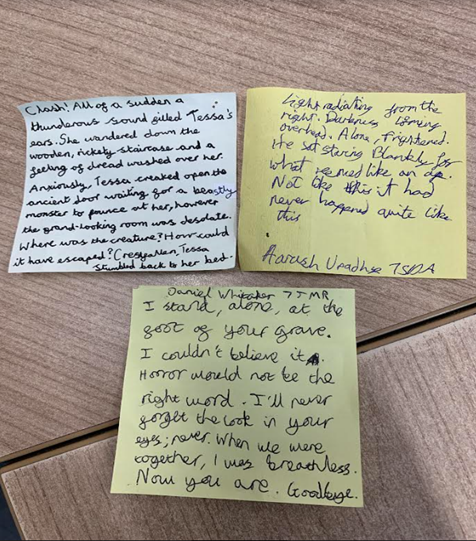
Selected Year 7 students were invited to participate in a Creative Writing Workshop with Ross Welford - author of The 1000 Year Old Boy. Here, these students learnt directly from a published author various insights and knowledge of how best to express themselves through literature! Fun was had by all attendees, and it was a valuable experience for all!
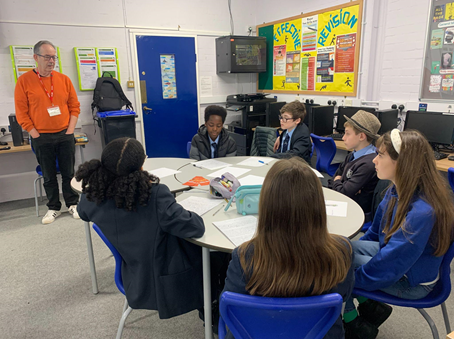
 This year, the Year 10s were able to take part in the Jack Petchey Public Speaking competition. Those who signed up were trained in writing speeches then performed these for their fellow peers.
This year, the Year 10s were able to take part in the Jack Petchey Public Speaking competition. Those who signed up were trained in writing speeches then performed these for their fellow peers.
I was lucky enough to be one of the judges and hear all the inspirational, creative speeches that were written. It was genuinely a hard decision to make as each speech made such valid points and were all well-spoken and calculated in their speeches.
The results were in order:

Louis will now move on to representing BGS in the regional finals: good luck, Louis!
The judges were: Mr Husbands, Chizara and Astrid
MC: Ms Adeaga
Congratulations to all who participated as you all did so well!
Chizara, Year 12 English Prefect
It was amazing to see what the Year 10s could come up with in terms of their speeches and the creativity embedded into each of their unique speeches. It was an honour to be able to judge them on their desired topics and interesting to see how each speech was inspired by their own personal experiences.
Astrid, Year 12 English Prefect
Well done to all entrants for the 'This is Me' Poetry competition earlier in the year. All poems were anonymised and judged by a panel of staff and Sixth Form English Prefects. They are incredibly impressed by the quality of work and found it very difficult to decide on an overall winner.
Congratulations to Nibodh Shrestha (8GTG). Princess Otto (8ERR) and Nifemi Abimbola (8ERR) won the top awards! Please see Nibodh's winning poem below.
Looking into a pond, a reflection you will see
The ripples of water, consisting of me.
Appearing calm, with elegance bestowed
A piece of art, precisely composed
Full of aid, the guiding light,
Shining ever so bright,
Showing the way,
Among the excellence of my rays
Upon the gaze of a mirror, you will see
My soul’s reflection, still and free
Appearing calm, with elegance bestowed
A piece of art, precisely composed
Thoughtfully orchestrated, a euphonious tune
From all dissonance, it is immune
The thoughtful composition is of such fashion
My harmonies showing much compassion
Through a window, you will see
The echoed essence of me
Appearing calm, with elegance bestowed
A piece of art, precisely composed
A tree all full of ripe fruits
For only giving it pursuits
All the nourishment it shall provide
Every fruit eaten comes a bounteous tide
In my reflections I discover my core
As the world continues more and more
Guided by light, seen through art
I shall have presented myself by my heart.
Our next Young Writers Competition is 'Fright Club'. A ghost story is a timeless classic style of creative writing, and we're inviting Year 8 to write their own short story inspired by things that go bump in the night! They could be inspired by a real place that is rumoured to be haunted, choose a supernatural being to be the star of their story or even be a ghost hunter telling us of their experiences. We encourage them to use atmosphere, tension and suspense to create their own hair-raising tale. Please note that there is a 250-word limit with prizes being awarded at the end of Spring term assembly. The deadline for entries to be sent to Mrs Boulden is Friday 22nd March.

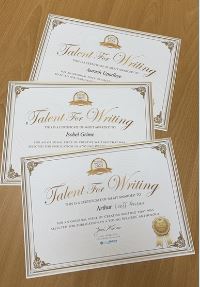
As well as the following three (who didn’t attend this week, but still won nonetheless!):
Aarush Upadhye
Isobel Grime
Arthur Loeff Freitas
The extracts submitted were truly exceptional, made even more impressive that they were all written during the club, across multiple weeks! A tremendous congratulations to all those who entered!
Year 12, English Prefects Team